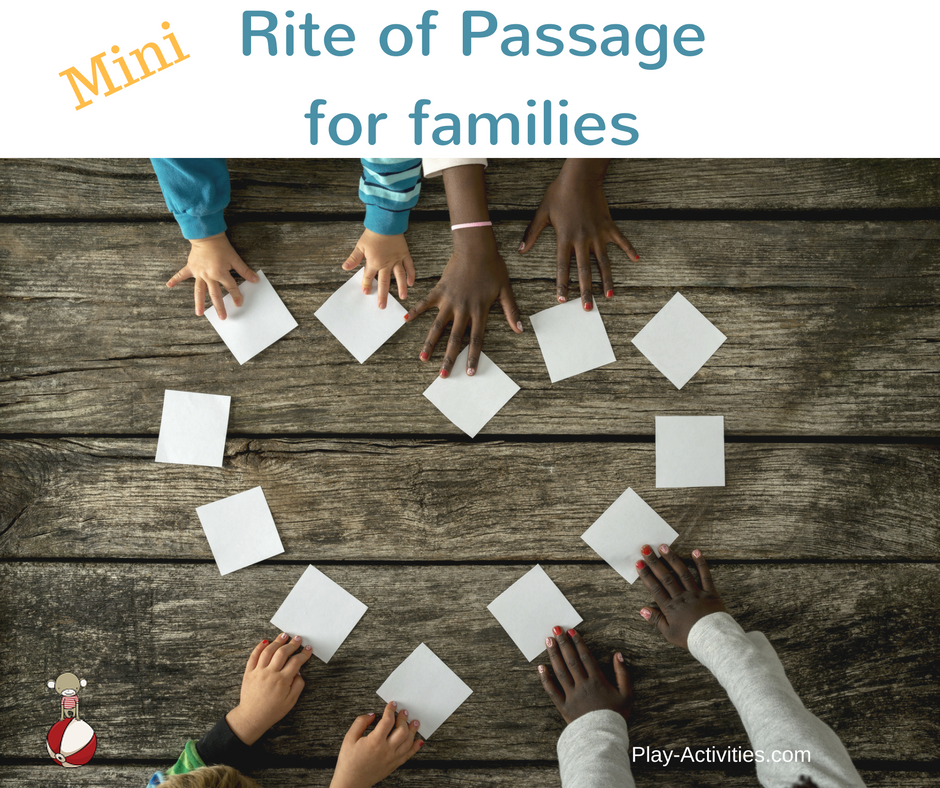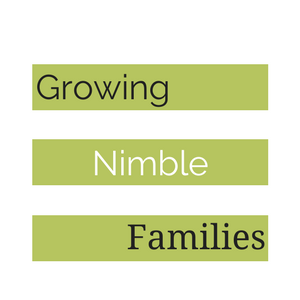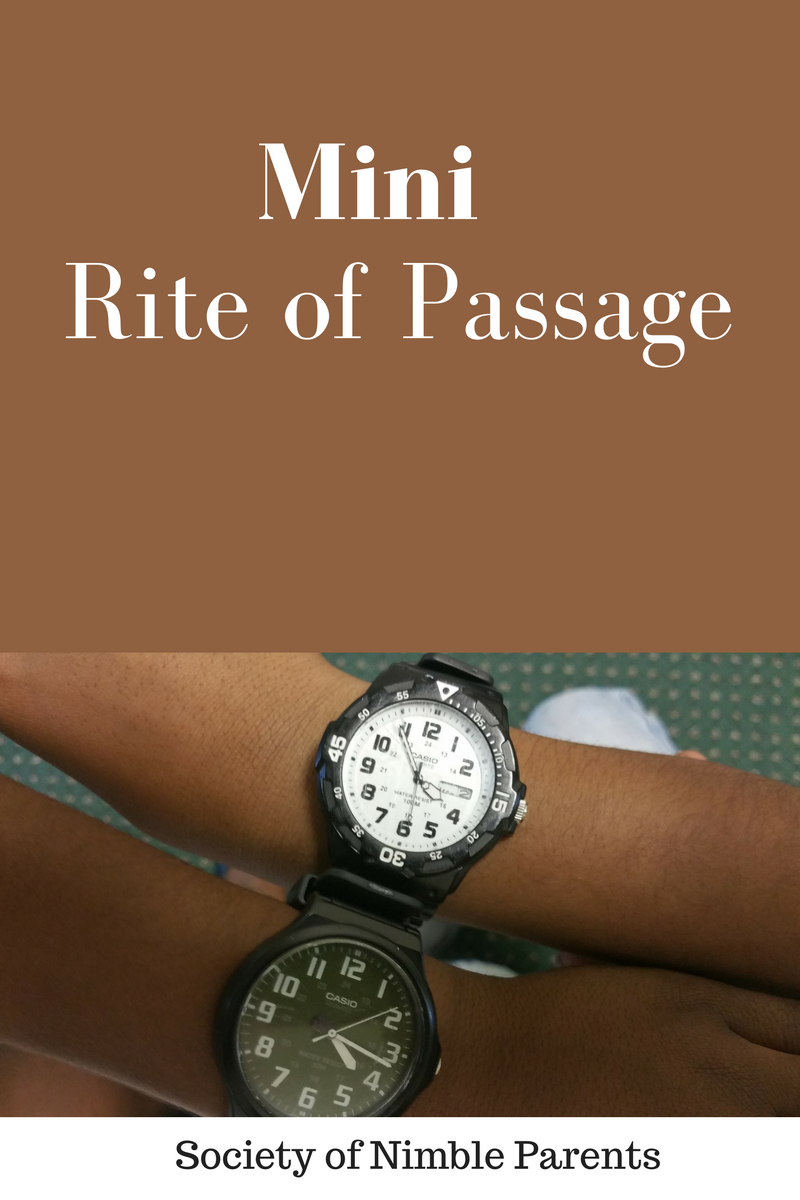 Are there gateway ages or specific markers in your family when special things happen? Examples might be doing laundry by themselves, collecting for a charity via shoebox or a mission trip or a special trip with a parent/grandparent?
Are there gateway ages or specific markers in your family when special things happen? Examples might be doing laundry by themselves, collecting for a charity via shoebox or a mission trip or a special trip with a parent/grandparent?
Usually when we talk about rites of passage we think of birthdays, weddings or graduations. These are usually grand ceremonies that take months of planning and often lots of money to celebrate.
But I’m thinking about smaller significant pointers in our family that we cherish for the memory they give and are no less significant because we don’t spend the big bucks. These rites of passage as small significant celebrations of the passage of childhood. They don’t just happen anyway like losing a tooth.
A rite of Passage offers a time of coming together to celebrate a place in childhood that every significant adult in that child’s life may share something special into their life.
We don’t have enough of these times when adults pour love, wisdom, kindness and faith into children’s lives.
Traditionally a rite of passage has a ceremony ( birthday party or wedding ceremony). They also have a symbol. (exchange of gifts, cards and perhaps a ring).
For this rite of passage within our family we honored the ceremony by being together and shared it with friends and family afterwards.
Part of the reason for a slimmed down version was timing and location and the other is that we wanted to have a more intimate mini rite of passage. In the same way a 21st birthday celebration is different to a 3rd birthday.
It is planned and anticipated like any other rite of passage.
The Watch
They have had novelty watches before. But very soon into elementary school we noticed that our children needed to be more accountable with their time.
- They asked about the time.
- There’s a need for an alarm clock.
- They wanted to go to a friend’s house.
- When we needed to meet them they needed to know when to leave.
- It was a time when we weren’t together all the time so they couldn’t rely on us being their timekeeper.
It is easier to see the passage of time with an analogue watch, otherwise time seemed meaningless. We have a large digital clock and we could see that 5 minutes or 15 minutes were just numbers but the power to understand time came from seeing that the movement of one long hand through to another place really gave them a better understanding.
Be able to tell the time using an analogue watch or clock was a responsibility of age. They were old enough to try and master.
The process
Each of our sons spent time differently mastering learning to tell the time using an analogue clock. We had plenty up in the house. At different times they had bought games, flashcards, made up games and they asked all the time what the time was or told us what they thought the time was. There were text books, stories, their brothers and friends who all were willing to help teach reading an analogue clock.
Each child on their own timeline, they all learned to tell the analogue time at different ages but they mastered it and were very excited. The testing time is a much anticipated time as each child has worked hard to master quarter to vs quarter past and five to vs fifty- five minutes to.
Once you can tell the time using an analogue clock you get to go with the whole family and choose a watch ( from a preselected group).
Making it special
The watch is waterproof, has date and time and often a second hand. They don’t have to take it off for swimming or showering- they can loosen it though. ( Bonus because otherwise they would lose it or leave it!) We chose a mid priced watch because it had to endure the rough and tumble of life. It needed to be something special but not too expensive that they would worry or fret. We were after simple, significant and special.
We had an unboxing at home all gathered around the table. It was often the same year they had a digital alarm clock so they can get up independently in the mornings. They learn to set it and we make a big deal about asking the time from them for weeks.
We mentioned on the way home from buying the watch that it’s part of learning to respect time and be timely. Perhaps this would have been better to have talked more about it at the unboxing. Everyone talked a little about time and the uses of their watch. Skype and phone conversations revolved around watches and time for weeks to follow. They wear the watch proudly .
It’s their first watch from our family.
Broken watches we replace and lost they replace.
It’s been interesting to see how each child has chosen watches within a similar family.
Mini rite of passage is no less significant
There are so many simple, significant and special rites of passage we could do to celebrate childhood transitions. Points in time that each child eagerly looks forward to that highlight the next stage in their passage to adulthood. They work hard to get there. Space where parents, friends and family can talk about values, lead with smiles and encouragement and celebrate a new hard done achievement.
While many rites of passage are traditionally attached to a specific time like graduation only happens at the end of a school season, these rites of passage are when your family chooses. The important part is the anticipation, the significance and the final celebration. Not all the kids will be as excited but they will remember.
Are there gateway ages or specific markers in your family when specific things happen?
I’d love to have a conversation about celebrating specific things or rites of passages. What’s your opinion? Have you done any?
For more simple schedules and family traditions have a look at my board .
or
Join the school based moms Facebook Group where we talk about things like this and more ways to connect with our school age children.
*Pin and Share*












